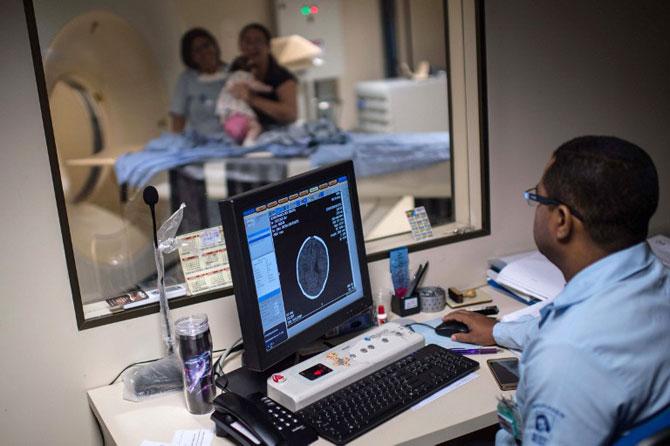Brazil is struggling to deal with a soaring number of Zika virus infections which have led to a staggering number of microcephaly cases in newborns

Doctors scan the brain of a newborn to detect a possible microcephalia caught through an Aedes aegypti mosquito bite, at the Obras Sociais Irma Dulce hospital in Salvador, Brazil. AFP PHOTO / Christophe SIMON / AFP / CHRISTOPHE SIMON
Brasilia: Brazil is struggling to deal with a soaring number of Zika virus infections which have led to a staggering number of microcephaly cases in newborns.
The country has reported some 3,900 cases of infections, with over 300 confirmed, Xinhua reported.
ADVERTISEMENT

Doctors scan the brain of a newborn to detect a possible microcephalia caught through an Aedes aegypti mosquito bite, at the Obras Sociais Irma Dulce hospital in Salvador, Brazil. AFP PHOTO / Christophe SIMON / AFP / CHRISTOPHE SIMON
Although the health ministry has reinforced actions against proliferation of the Aedes aegypti mosquito, which transmits Zika and dengue, microcephaly cases in the South American country has not shown any sign of decline.
Zika was believed to reach Brazil during the World Cup in 2014. In contrast to the lethal dengue, Zika was at first taken as a lesser problem. Because the country has no antibodies against it, the disease is feared to have the potential for an outbreak.
The surging Zika cases, later found to have caused a sudden soaring increase in microcephaly cases, have become a major concern for the Brazilian health authorities in the second half of 2015.
The problem was first spotted in the state of Pernambuco. After noticing the sudden increase in microcephaly cases, from less than a dozen per year to more than hundreds in just a few months, local pediatricians managed to make an initial association between the development and the Zika outbreak that occurred months earlier in the region.
The alarming contagious rate of the Zika virus was finally reported to the health ministry.
With scientific evidence demonstrating Zika's responsibility for the rise of microcephaly cases in hand, the Pernambuco government declared a state of public health emergency, taking the conventional actions regulated in the endemic dengue prevention programme so as to wipe out the Aedes aegypti mosquito, a task the country has yet to finish despite two decades' efforts.
The government has admitted that it has been a formidable fight. Earlier this week, Brazilian Health Minister Marcelo Castro said the country was losing the battle.
Rio's authorities have been particularly alarmed by the statement, as the city, usually a hotspot for dengue, will receive hundreds of thousands of visitors during the upcoming Carnival and the Olympic Games set to open in August.
The anxiety over the spread of the Zika virus has become international after several Latin American countries reported hundreds of Zika cases.
The US has reported its first microcephaly case related to the Zika virus. The mother of the infected baby has been to Latin America.
Some countries have issued alerts warning pregnant women not to travel to Zika-affected regions.
Health authorities in several nations have launched research on the disease, hoping to find means to control the reproduction of the Aedes mosquito.
 Subscribe today by clicking the link and stay updated with the latest news!" Click here!
Subscribe today by clicking the link and stay updated with the latest news!" Click here!







